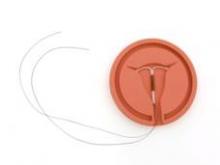Long-acting contraceptive methods – intrauterine devices and subdermal implants – were superior to oral contraceptives, transdermal patches, and vaginal rings in preventing unintended pregnancies, results from a prospective study of more than 7,000 at-risk women show. The report is in the May 24 issue of the New England Journal of Medicine.
"We found that participants using oral contraceptive pills, a transdermal patch, or a vaginal ring had a risk of contraceptive failure that was 20 times as high as the risk among those using long-acting reversible contraception," said Dr. Brooke Winner of the department of obstetrics and gynecology, Washington University, St. Louis, and her associates.
The researchers attributed this difference to the fact that once IUDs and implants are inserted, they are not user dependent, whereas the other methods in this study depend on correct and consistent usage by the patient.
Approximately 3 million pregnancies each year in the United States, or half of all pregnancies here, are unintended. This rate is significantly higher than that in other developed countries. Half of these unintended pregnancies are due to incorrect or inconsistent use of contraceptives, and the other half to nonuse of contraceptives.
Dr. Winner and her associates conducted a prospective cohort study of women aged 14-45 years who were at risk for unintended pregnancy because they were not using any contraception or were using it only sporadically. The women received counseling regarding all reversible contraceptive methods, which covered the effectiveness, risks, benefits, and side effects of each (N. Engl. J. Med. 2012;366:1998-2007).
They then were given the contraceptive method of their choice at no cost for 2-3 years. The women were allowed to discontinue or switch methods as often as they wished during follow-up.
The 7,486 study subjects were followed via telephone interviews every 6 months, and any changes in their contraceptive use or pregnancy status were documented in a log. This information was corroborated with pharmacy data where the subjects filled their prescriptions.
Between 2007 and 2011, there were 334 unintended pregnancies in these study subjects.
At 1-year, 2-year, and 3-year follow-up, the women using OCs, patches, or vaginal rings had higher rates of unintended pregnancy than did those using IUDs or implants. The contraceptive failure rates were 4.8% vs. 0.3% at 1 year, 7.8% vs. 0.6% at 2 years, and 9.4% vs. 0.9% at 3 years.
The failure rate for depot medroxyprogesterone acetate (DMPA) injections was similar to that with IUDs and implants: 0.1% at 1 year, 0.7% at 2 years, and 0.7% at 3 years.
Looked at from a different perspective, the failure rate for OCs, patches, and rings combined was 4.55 per 100 woman-years, compared with 0.27 per 100 woman-years with IUDs and implants combined.
After the data were adjusted to account for subject age, education level, and number of previous unintended pregnancies, the risk of unintended pregnancy remained markedly higher in women using OCs, patches, or rings than among those using IUDs or implants, with a hazard ratio of 21.8.
The researchers hypothesized that younger women would be less consistent with their use of contraceptives than would older women, so they analyzed the data by subject age to test this hypothesis. They found that subjects younger than 21 years using OCs, patches, or rings were almost twice as likely to have an unintended pregnancy as were older women using those methods.
In contrast, among women using IUDs, implants, or DMPA injections, which do not depend on user consistency, there were no significant differences according to age in the rates of unintended pregnancy.
This finding "underscores the potential benefits of offering adolescents long-acting reversible contraception (which does not require daily, weekly, or monthly compliance) to reduce unintended pregnancies in this high-risk age group," Dr. Winner and her associates said.
They added that their study was somewhat limited in that all contraception was provided at no cost to the women, "which may have improved adherence and led to an underestimation of failure rates."
This study was supported by the Susan Thompson Buffet Foundation. Dr. Winner’s associates reported ties to Omnia Education, Merck, Lippincott, and Bayer HealthCare Pharmaceuticals.

